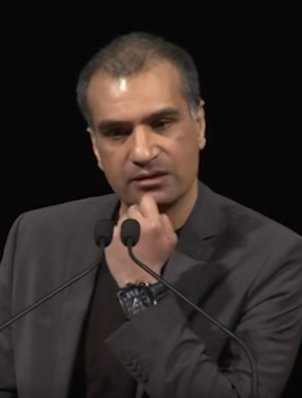
Nadeem Aslam
British Pakistani novelist who explores Pakistan, Afghanistan and the Muslim experience, renowned for his lyrical prose
Place of birth
Date of arrival to Britain
Location(s)
HD1 2AA
United Kingdom
Date of time spent in Britain
1980–
About
Nadeem Aslam was born in Gujranwala, a city in Pakistan's Punjab region. He was 11 years old when General Zia-ul-Haq came to power in Pakistan through a military coup in 1977, launching a campaign to impose ‘Islamic values’ across the country. Aslam, whose mother tongue was Punjabi, had attended Urdu-medium schools in Pakistan, as English education was largely reserved for the privileged.
At the age of 14, Aslam and his family were forced to flee Pakistan due to his father’s political convictions under General Zia-ul-Haq’s regime. They migrated to Britain, settling in Huddersfield, West Yorkshire. Aslam, a teenager at the time, barely spoke English. He taught himself the language by copying entire novels by hand, including works by Vladimir Nabokov, Gabriel García Márquez and Toni Morrison. Encouraged by his teachers to pursue science for its simpler language requirements, Aslam initially studied biochemistry at the University of Manchester but dropped out in his third year when he felt confident enough in his English to pursue his true passion for writing.
Determined to get his work published, Aslam mailed his debut novel manuscript to André Deutsch, after discovering the publisher’s contact details in V. S. Naipaul’s A Bend in the River, where it was promptly accepted by Naipaul's editor at the time. As the author of five novels, Aslam addresses a wide range of issues, including honour killings, religious divides within the Muslim world, the Soviet invasion of Afghanistan and the impact of 9/11. His writing is celebrated for its lyrical English prose, which beautifully mirrors the rhythm of Urdu.
Nadeem Aslam's debut murder-mystery novel, Season of the Rainbirds (1993), won the Betty Trask Award and the Authors’ Club Best First Novel Award. Aslam’s second novel, Maps for Lost Lovers (2004), garnered global critical acclaim for its poignant exploration of the lives of an isolated working-class immigrant community consisting of Muslims, Hindus and Sikhs in a small English town. To perfect his English for the novel, Aslam took on a variety of odd jobs, including bar work and manual labour. The novel, which took over a decade to complete, with the first chapter alone taking six years, won the Encore Award and the Kiriyama Prize and was longlisted for the prestigious Man Booker Prize.
Betty Trask Award for Season of the Rainbirds, 1994
Authors’ Club First Novel Award for Season of the Rainbirds, 1994
Encore Award for Maps for Lost Lovers, 2005
Kiriyama Prize for Maps for Lost Lovers, 2005
Lannan Literary Fellowship for Fiction, 2005
Windham-Campbell Prize for Fiction, 2014
André Deutsch
Season of the Rainbirds (London: Faber & Faber, 1993)
Maps for Lost Lovers (London: Faber & Faber, 2004)
The Wasted Vigil (London: Faber & Faber, 2008)
The Blind Man's Garden (London: Faber & Faber, 2013)
The Golden Legend (London: Faber & Faber, 2017)
Ahmed, Rehana, ‘Creative Freedom and Community Constraint in Nadeem Aslam's Maps for Lost Lovers’, in Writing British Muslims: Religion, Class and Multiculturalism (Manchester: Manchester University Press, 2015), pp. 154–82
Aslam, Nadeem and Sethi, Sunil, ‘A Conversation with Nadeem Aslam’, India International Centre Quarterly 35.3/4 (2008), pp. 348–61
Bhagya, C. S., ‘Nadeem Aslam’, Postcolonial Writers Make Worlds (2018), https://writersmakeworlds.com/nadeem-aslam/
Flannery, Eóin, ‘Internationalizing 9/11: Hope and Redemption in Nadeem Aslam's Wasted Vigil (2008) and Colum McCann's Let the Great World Spin (2009)’, English: Journal of the English Association 62.238 (2013), pp. 294–315
Hossain, Md Alamgir, ‘Muslims in Diaspora: Negotiating Identity in Nadeem Aslam’s Maps for Lost Lovers’, South Asian Review, 42.1 (2020), pp. 94–108
Jaggi, Maya, ‘Nadeem Aslam: A Life in Writing’, Guardian (26 January 2013), https://www.theguardian.com/culture/2013/jan/26/nadeem-aslam-life-in-writing
Miller, Beth, ‘Reading as Resistance: Practicing Literacy and Interconnection in Nadeem Aslam’s The Golden Legend’, The Comparatist 43 (2019), pp. 341–55
Morey, Peter, ‘Islamophobia and the Global Novel: “Worlding” History in Nadeem Aslam and Kamila Shamsie', in Islamophobia and the Novel (New York: Columbia University Press, 2018), pp. 183–210
Pataki, Éva, ‘This Dasht-e-Tanhaii called the planet Earth": The Metamorphosis of Space and Identity in Nadeem Aslam’s Maps for Lost Lovers’, Hungarian Journal of English and American Studies (HJEAS) 20.2 (2014), pp. 79–100
Pirzadeh, Saba, ‘Topographies of Fear: War and Environmental Othering in Mirza Waheed's The Collaborator and Nadeem Aslam's The Blind Man's Garden’, Interventions 21.6 (2018), pp. 892–907
Yaqin, Amina, ‘Muslims as Multicultural Misfits in Nadeem Aslam's Maps for Lost Lovers’, in Rehana Ahmed, Peter Morey and Amina Yaqin (eds) Culture, Diaspora, and Modernity in Muslim Writing (New York: Routledge, 2012), pp. 101–16
Image credit
By Aflatoon.editor – own work, CC BY-SA 4.0, https://commons.wikimedia.org/w/index.php?curid=158093988
Entry credit
Anisah Rahman
